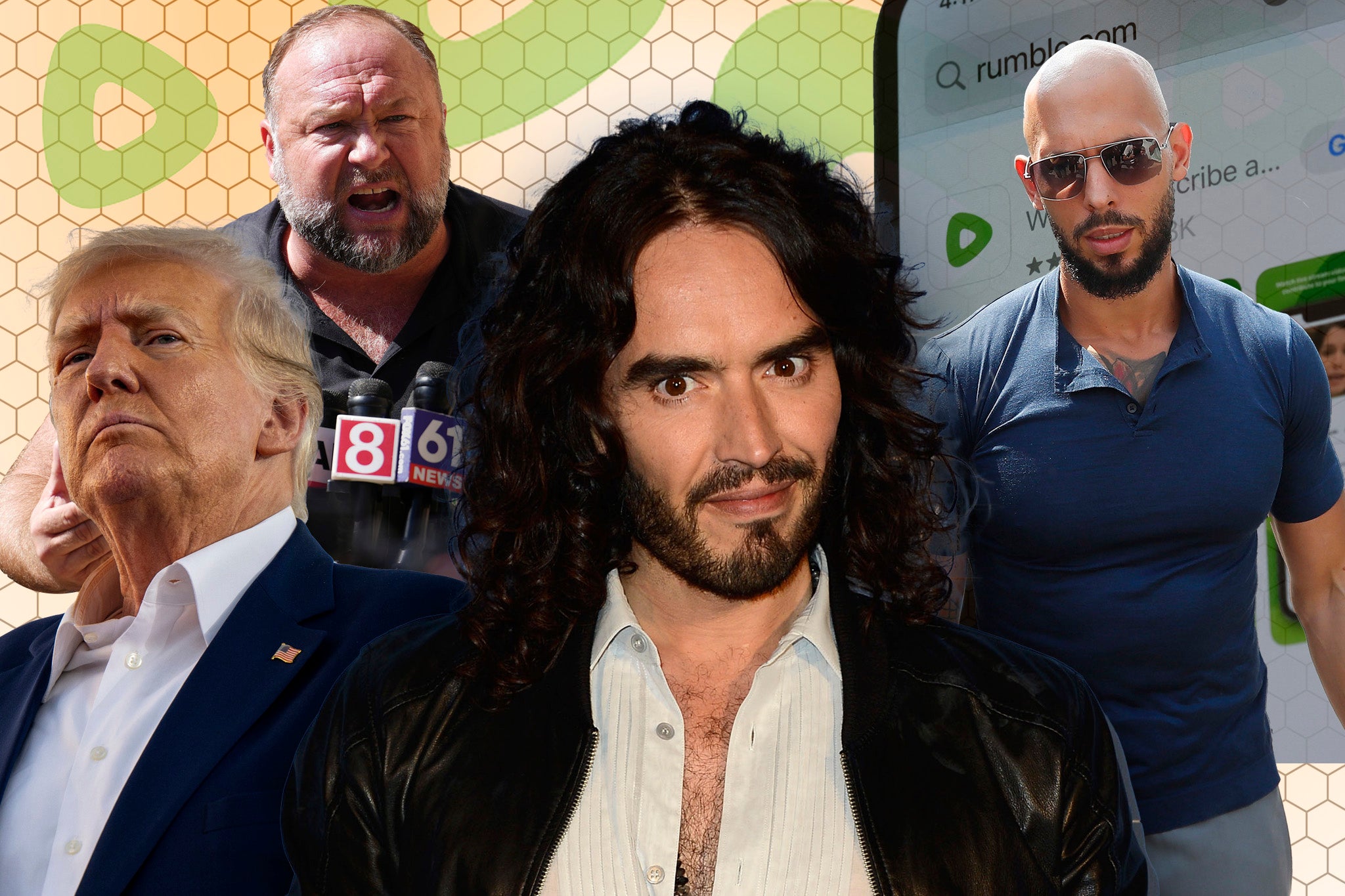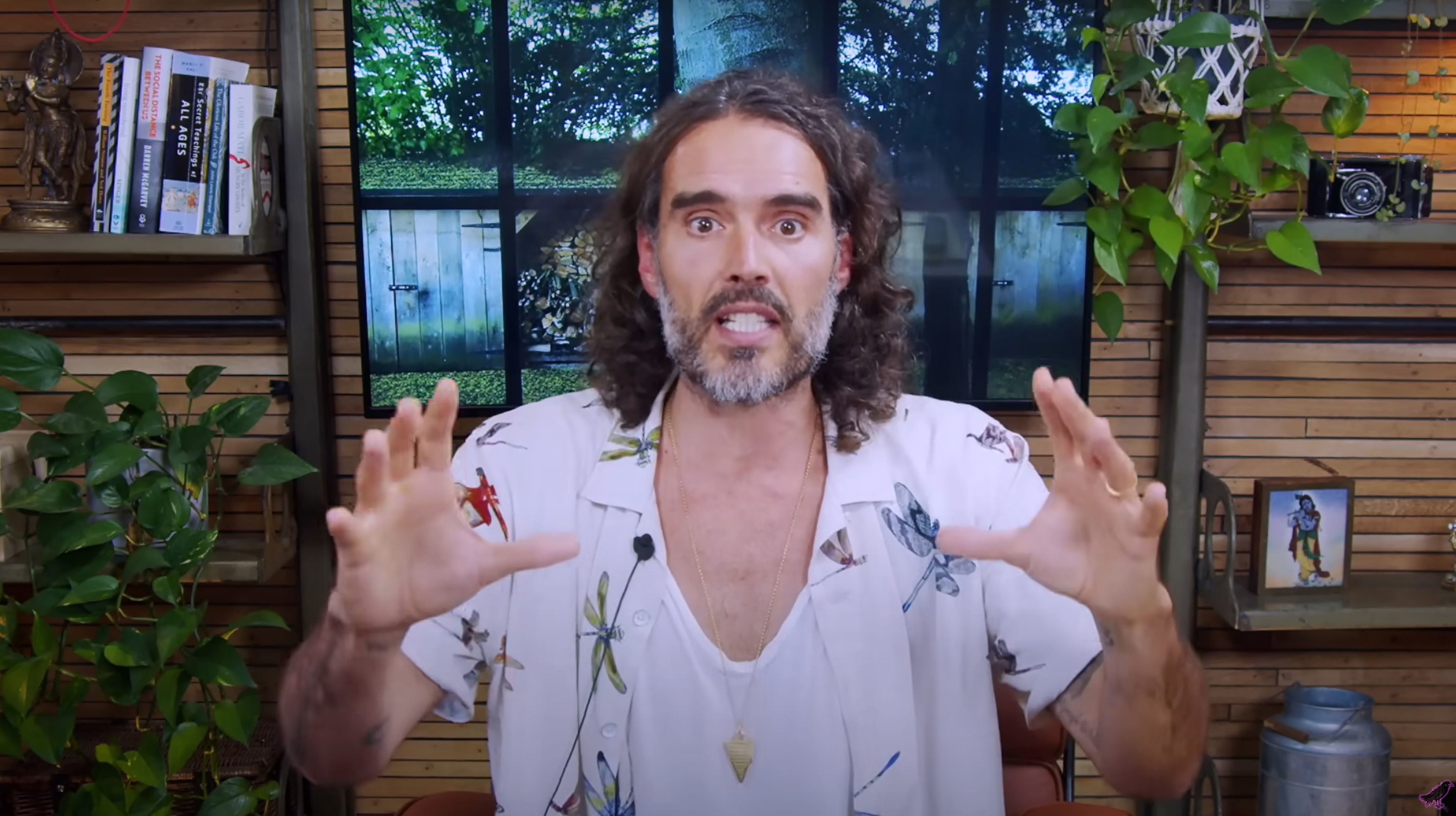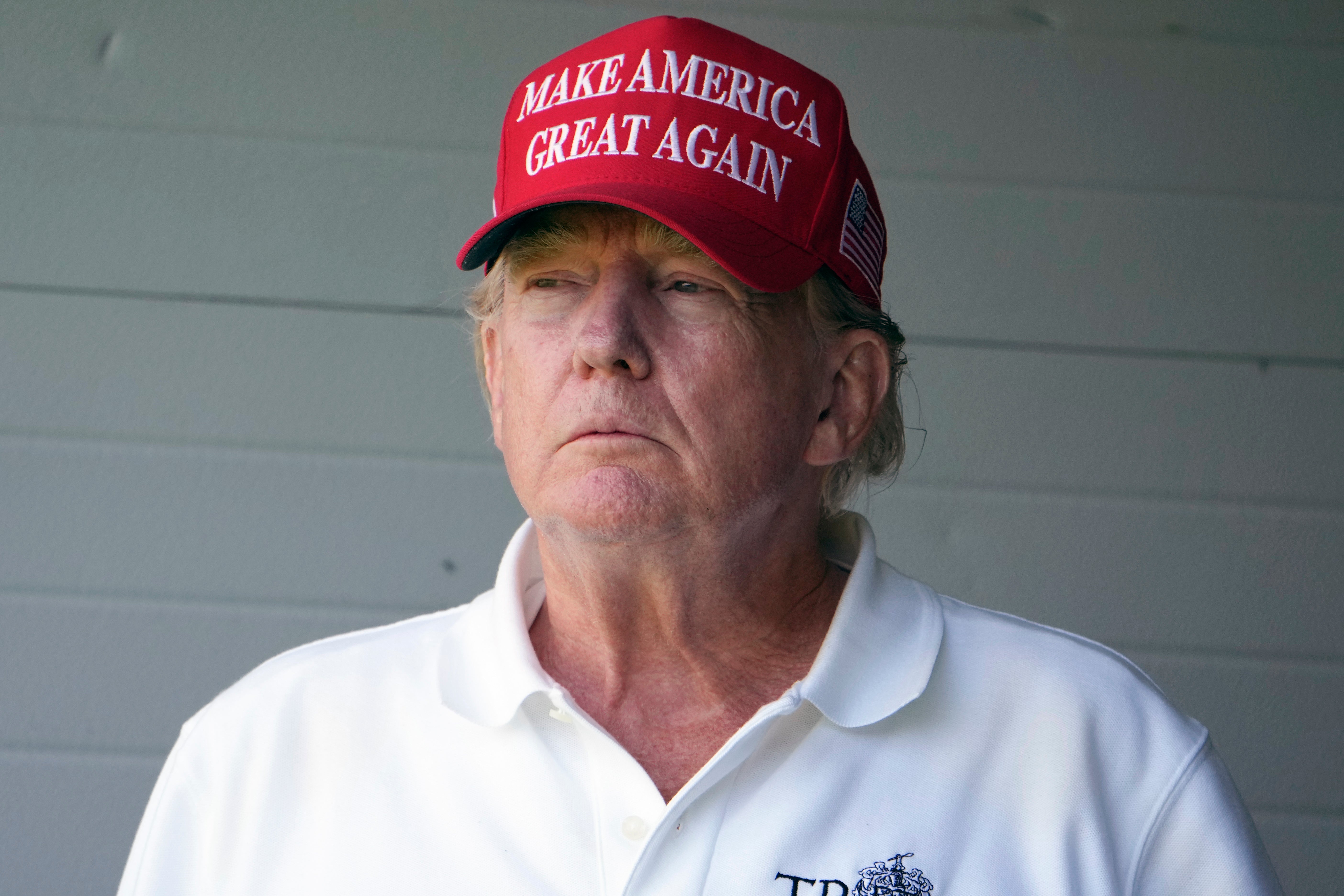Inside Rumble, the YouTube alternative beloved by Russell Brand and the Trumps
The video-sharing platform has become a haven for those exiled from mainstream media channels. As the BBC, Channel 4 and Paramount+ distance themselves from Russell Brand, Annabel Nugent asks whether Rumble is his port in the storm?


All is not lost for Russell Brand. Despite the allegations of rape, sexual assault and emotional abuse made against him, all of which he vehemently denies, and his subsequent exile from mainstream media, one platform is currently touting its close proximity to the star as a selling point. “Join Rumble today,” former Fox News presenter and Rumble bankroller Dan Bongino said earlier this week. “Russell is already there.” So too are Donald Trump, Donald Trump Jr, misogynist mega-influencer Andrew Tate, and Sandy Hook conspiracy theorist Alex Jones.
As of 2022, the video-sharing platform (effectively an alternative to YouTube) reported 78 million active users globally. Brand has been one of those users for just over a year. On Rumble, he has 1.4 million followers – or “awakening wonders” as he so oddly calls them. It’s a somewhat paltry figure compared to the 6.63 million he has on YouTube, but not insubstantial by any means. And with YouTube now demonetising Brand’s channel in light of the recent allegations, the comedian is expected to continue profiting from Rumble instead – and those subscriber figures may very well tick up.
Brand joined Rumble in September last year, after receiving repeated warnings from YouTube over his mostly Covid-related videos. Rumble, he claimed, was a better platform for his content, as it advertises looser restrictions and a steadfast “resist censorship” ethos. The move looked like a logical next step for Brand, whose journey from Noughties British TV darling to online fringe personality has been ongoing. The subjects of some of his recent Rumble videos range from Prince Harry and the so-called “Deep State” to anti-vax conspiracy theories. Notably, he still posts on YouTube, but as reported by The Guardian, it was on Rumble that he got ahead of The Times and Channel 4 last week, by addressing the fact that media outlets were preparing to publish what he called “very, very serious criminal allegations” against him.
Founded in 2013 by the Canadian tech entrepreneur Chris Pavlovski, Rumble is relatively young in the media landscape. (For comparison, YouTube was established in 2005; Facebook, 2004; Twitter, 2006). In those 10 years, though, it has emerged as a major player among “free speech-focused” alt-tech apps, a group that also includes Parler, a Twitter substitute that fell to the wayside in early 2021 once Amazon said it would no longer host it on its computing service. That decision came after it was used by rioters to extensively document their assault on the US Capitol.
Rumble has since proven itself a haven for self-stylised media outcasts and “censored” voices. For figures like Tate, Trump and Jones, who at one point or another have been banished from mainstream channels, Rumble is a port in the so-called “woke storm”. And for Brand now, too – who, to be clear, has not been banned from YouTube, where he is still allowed to post, but is no longer able to monetise his content on the platform. On Friday 22 September, Pavlovski responded to what he called an “extremely disturbing letter” Rumble received from Dame Caroline Dinenage, UK’s chair of the culture, media, and sport committee, questioning the platform’s decision to continue allowing Brand to earn money on the platform.
In response, Pavlovski wrote on X: “While Rumble obviously deplores sexual assault, rape, and all serious crimes, and believes that both alleged victims and the accused are entitled to a full and serious investigation, it is vital to note that recent allegations against Russell Brand have nothing to do with the content on Rumble’s platform.” He continued to say that “Rumble stands for very different values”, one of those being “defending a free internet – meaning an internet where no one arbitrarily dictates which ideas can or cannot be heard, or which citizens may or may not be entitled to a platform”. He “emphatically” rejected Dinenage’s “demands”.
It is a site predicated on the mission to, as its manifesto states, remain “immune to cancel culture” above all else. Jones, who still refuses to pay a cent of the $1.5bn damages he owes families of the victims of the Sandy Hook school shooting he called a hoax, has attracted 253,000 followers on Rumble. There, he proudly lays claim to hosting “The most banned broadcast in the world”.
Rumble isn’t the only one of its kind, but it is the most popular. Callum Hood, the Head of Research at the Centre for Countering Digital Hate, says: “Our tracking shows that Rumble is getting more visitors than other similar streaming sites because it has attracted influential alt-right figures to use its platform and rewarded them handsomely with generous ad and subscriber revenue deals.”

Take Andrew Tate. The hugely popular self-professed alpha male guru – who remains banned from YouTube, TikTok, Twitter, Facebook and Instagram – joined Rumble in 2022 in a deal that CNN reported was worth $9m (a figure Rumble did not deny), and the announcement of his debut briefly sent Rumble to the top of the Apple and Google app stores. Tate has since faced charges of rape and sex trafficking in Romania. In response to the charges, Rumble did not remove his videos but instead issued a statement that echoes many of the same sentiments as their most recent statement concerning Brand. Rumble, it said, condemned human trafficking and sexual abuse but maintained that “every accused deserves due process”. It continued: “The allegations against Andrew Tate, which do not appear to involve any content on Rumble, should be investigated promptly and thoroughly, and we will not prejudge that investigation.”
Beyond the YouTube exiles finding refuge on Rumble, its content creators mostly comprise your garden variety conservative commentators, among them Charlie Kirk, Steven Crowder and Ben Shapiro. But they, and many like them, use Rumble as a secondary if not tertiary place to reshare TV clips and podcast episodes already posted on traditional outlets such as YouTube. Few actually produce any original content for the site – though, not for lack of trying. As New York Magazine reported earlier this year, the platform is busying itself building its own roster of talent. Last year, a $100m bid to poach podcast king Joe Rogan from Spotify was reportedly unsuccessful.
We’re seeing a race to the bottom, as alternative platforms engage in a bid for an audience interested in seeing hateful and conspiracy content
The experience of being on Rumble is intensely conservative – think YouTube caught in a right-wing recommendation loop. This wasn’t always Pavlovski’s vision. He first conceived Rumble as a new home for small-time creators forgotten by YouTube, which had begun to prioritise only its most successful influencers. For its first seven or so years of existence, Rumble hosted harmless viral clips and snippets of news. It was only in 2020, between the overlapping crises of a pandemic and an ugly disputed election, that Rumble found its crowd. Its popularity soared, with monthly users increasing from two million to more than 20 million at the end of that year, according to Forbes. An anything-goes site is an attractive prospect for high-profile figures facing bans or critical fact-checks on other platforms.

When former congressman Ron Paul was suspended from YouTube for spreading medical misinformation about Covid in 2021, Pavlovski personally invited the politician to join his ranks instead. In November 2020, former Donald Trump adviser Steve Bannon had his @WarRoomPandemic account banned from Twitter and YouTube over a video in which he said Joe Biden’s chief medical adviser Dr Anthony Fauci should be beheaded. According to his Rumble profile, Bannon joined the platform that very same day. It was also in 2020 that popular podcasts X22 Report and Red Pill News were purged from YouTube for spreading content related to the conspiracy group QAnon. Today, both regularly appear in Rumble’s recommendations. Trump himself, who now has two million followers on the platform, joined Rumble after he was blocked by other channels.
That Rumble has become a notorious hotbed for misinformation is a given. Despite its claims that it does not promote misinformation or conspiracy theories (it simply has a “free-speech approach to regulation”), a 2021 report by Wired found that if you searched “vaccine” on the platform, you were three times more likely to be recommended videos containing misinformation about Covid than accurate information. If you searched for “election”, you were twice as likely to be recommended misinformation rather than factual content.
Documentaries that would likely be taken down on other websites receive prime placement on Rumble, such as The Deep Rig and Died Suddenly, films that spout unsubstantiated claims of election fraud and anti-vax conspiracy theories, respectively. Rumble did not respond to The Independent’s request for comment, but a spokesperson for the platform previously told Wired: “Rumble has strict moderation policies banning the incitement of violence, illegal content, racism, antisemitism, promoting terrorist groups (designated by US and Canadian governments), and violating copyright, as well as many other restrictions.”

Colm Coakley from the Centre for Countering Digital Hate says that the way to counter the misinformation spread by platforms such as Rumble is to “make sure that all platforms clearly set out their policies, explain to users how they enforce them and open them all up to public scrutiny through transparency measures so we can have an informed public conversation about online harms”. Otherwise, he says, “we get the race to the bottom that we’re seeing, as alternative platforms engage in a bid for an audience interested in seeing hateful and conspiracy content”.
As of 20 September, Rumble’s most-watched list – known on the website as its Battle Leaderboard – includes an episode of The Dan Bongino Show, in which the conservative commentator and big-time Rumble bankroller promises to address “the latest barrage of lies” told by an ambiguous “they”. Other popular videos include an instalment of X22 Report; Steven Crowder speaking out against YouTube’s decision to demonetise Brand; a video titled “Girls LEAVE good men with green cards but expect chivalry?!”; and Andrew Tate delivering a diatribe about beauty.
A 2022 Pew Research Centre study found that 75 per cent of users identify as Republican or Republican-leaning
Given the overwhelmingly conservative content on Rumble, it comes as little surprise that a Pew Research Centre study in December last year found that 75 per cent of users identify as Republican or Republican-leaning. More surprising, though, is the 22 per cent of people “regularly getting news from Rumble” who identify as Democrats or Democrat-leaning. According to Wired, Rumble itself claims to be bipartisan. When the company went public last year (it is worth just over $3bn), Pavlovski gave a speech outlining Rumble’s mission: to restore objectivity to the internet; “bring it back to the middle” and “make it as neutral as possible”. It is hard to ignore Rumble’s heavily right-skewing clientele, however. And when Pavloski debuted its livestream tool in 2021, he chose the Conservative Political Action Conference to showcase it – an event at which Donald Trump, its keynote speaker, reiterated false claims that he had actually won the 2020 election. Rumble’s financial backers, too, who include tech billionaire Peter Thiel and Hillbilly Elegy author JD Vance, are known to hold conservative views.

One apparent outlier in the Rumble roster is Glenn Greenwald. The investigative journalist resigned from The Intercept, the left-wing news site he co-founded, in 2020, accusing editors of trying to censor a column he wrote pertaining to materials retrieved from a laptop that had belonged to Joe Biden’s son Hunter. A year later, The Washington Post reported that Greenwald took a year-long contract with Rumble in the “midrange six figures”. Speaking to Rolling Stone, Greenwald said he is unbothered by the fact he sits in Rumble’s most-watched list alongside anti-vaxxers, QAnon believers and election deniers. “To me, that’s guilt by association,” he told the publication. “You’re on Twitter, you’re on a platform with Donald Trump Jr and people who are pushing all sorts of things.” (At the start of this year, the former president’s son signed an exclusive partnership with Rumble to air his biweekly show Triggered with Don Jr). Political affiliations aside, Greenwald regarded Rumble as a bastion for free speech in contrast to the “expanding” censorship on the internet.
Greenwald did admit that he would like to see more “diverse” voices on the platform and claimed that Rumble was in the process of securing “some pretty big, very well-recognised left-wing voices” to balance their roster. That may be the case, but as it stands now, there is no denying its political edge. And as people, such as Brand, find themselves with nowhere else to go, Rumble is waiting for them and their millions of followers with open arms.






Join our commenting forum
Join thought-provoking conversations, follow other Independent readers and see their replies
Comments